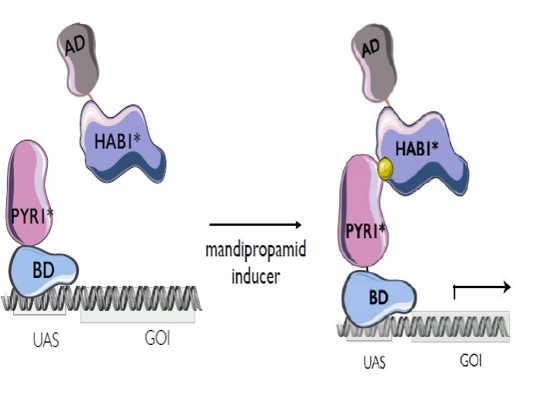Novel Genetic Switch for Inducing Gene Expression
Background
Systems for regulating biological responses with small molecules have broad biotechnological utility and are generally built by modifying natural regulatory circuits. Many areas of biotechnology and genetic engineering can benefit from using techniques that modify natural regulatory circuits, and possible applications include developing new citrus varieties by accelerating citrus plant breeding and single cell therapies like CAR T-cell therapy.
Brief Description
Prof. Sean Cutler and colleagues at the University of California, Riverside have engineered a system and methods to induce gene expression in plants and organisms, including mammals, using the chemical compound mandipropamid. Using the PYR/PYL/HAB1 promoter system, the PYR1/HAB1 system is reprogrammed to be activiated with mandipropamid. When the PYR1/HAB1 system dimerizes through chemical induced dimerization (CID) with mandipropamid, the system functions as a control switch for gene expression.
This technology has been demonstrated to advantageously accelerate citrus breeding. It may be applied to improve CAR T-cell therapy and agricultural crops.

Fig 1: UCR’s PYR1/HAB1 system is programmed through chemical induced dimerization (CID) initiated by mandipropamid to function as a switch for agrochemical control of gene expression.
Applications
- Engineered switches for agrochemical control of gene expression in crops
- “On-demand” flowering to accelerate breeding
Patent Status
| Country | Type | Number | Dated | Case |
| United States Of America | Issued Patent | 10,919,943 | 02/16/2021 | 2015-755 |
Contact
- Rekha Chawla
- rekha.chawla@ucr.edu
- tel: View Phone Number.
Other Information
Keywords
genetic expression, PYR/PYL/HAB1, citrus, mandipropamid
